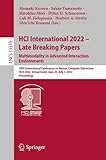HCI International 2022 - Late Breaking Papers. Multimodality in Advanced Interaction Environments [electronic resource] : 24th International Conference on Human-Computer Interaction, HCII 2022, Virtual Event, June 26 - July 1, 2022, Proceedings / edited by Masaaki Kurosu, Sakae Yamamoto, Hirohiko Mori, Dylan D. Schmorrow, Cali M. Fidopiastis, Norbert A. Streitz, Shin'ichi Konomi.
Contributor(s): Kurosu, Masaaki [editor.] | Yamamoto, Sakae [editor.]
| Yamamoto, Sakae [editor.] | Mori, Hirohiko [editor.]
| Mori, Hirohiko [editor.] | Schmorrow, Dylan D [editor.]
| Schmorrow, Dylan D [editor.] | Fidopiastis, Cali M [editor.]
| Fidopiastis, Cali M [editor.] | Streitz, Norbert A [editor.]
| Streitz, Norbert A [editor.] | Konomi, Shin'ichi [editor.]
| Konomi, Shin'ichi [editor.] | SpringerLink (Online service)
| SpringerLink (Online service) .
.
Material type:  BookSeries: Lecture Notes in Computer Science: 13519Publisher: Cham : Springer Nature Switzerland : Imprint: Springer, 2022Edition: 1st ed. 2022.Description: XX, 558 p. 268 illus., 206 illus. in color. online resource.Content type: text Media type: computer Carrier type: online resourceISBN: 9783031176180.Subject(s): User interfaces (Computer systems)
BookSeries: Lecture Notes in Computer Science: 13519Publisher: Cham : Springer Nature Switzerland : Imprint: Springer, 2022Edition: 1st ed. 2022.Description: XX, 558 p. 268 illus., 206 illus. in color. online resource.Content type: text Media type: computer Carrier type: online resourceISBN: 9783031176180.Subject(s): User interfaces (Computer systems)Multimodal Interaction and Psychophysiological Computing -- 3D Hand Pose Recognition over a Wide Area using Two Omnidirectional Cameras with Field-of-view Division -- Towards a Dynamic Model for the Prediction of Emotion Intensity from Peripheral Physiological Signals -- Introduction to the 2nd Edition of "Semantic, Artificial and Computational Interaction Studies" -- Towards Efficient Odor Diffusion with an Olfactory Display Using an Electronic Nose -- Rendering Personalized Real-time Expressions While Speaking Under a Mask -- Applying Generative Adversarial Networks and Vision Transformers in Speech Emotion Recognition -- Development of a Web-based Interview Support System Using Characters Nodding with Various Movements -- Emotion Recognition from Physiological Signals using Continuous Wavelet Transform and Deep Learning -- Surrogate Sensory Feedback of Grip Force in Older and Younger Participants only Influences Fine Motor Control, but not the Object Weight Perception -- Laughter Meaning Construction and Use in Development: Children and Spoken Dialogue Systems -- Skeleton-Based Sign Language Recognition With Graph Convolutional Networks on Small Data -- Gesture Elicitation for Augmented Reality Environments -- A Systematic Procedure for Comparing Template-based Gesture Recognizers -- An Elderly User-Defined Gesture Set for Audio Natural Interaction in Square Dance -- Using Fiducial Marker for Analyzing Wearable Eye-Tracker Gaze Data Measured while Cooking -- Using Wearable Devices for Emotion Recognition in Mobile Human-Computer Interaction: A Review -- Human-Robot Interaction -- Human-Robot-Collaboration in the Healthcare Environment: An Exploratory Study -- Towards an Active Predictive Relation by Reconceptualizing a Vacuum Robot: Research on the Transparency and Acceptance of the Predictive Behaviors -- On Improving the Acceptance of IntelligentCompanion Robots Among Chinese Empty-Nesters with the Application of Emotion-al Design -- Human Interpretation of Inter-robot Communication -- Conversational Agents and Robot Interaction -- Surgical Human-Robot Interaction: A Bibliometric Review -- Human Intention Recognition for Safe Robot Action Planning using Head Pose -- Mobile Manipulator for Hospital Care using Firebase -- Iterative Design Process for HRI: Serving Robot in Restaurant -- Brain-Computer Interfaces -- Methodology Design of the Correlation between EEG Signals and Brain Regions Mapping in Panic Attacks -- Establishing Clinical Protocols for BCI-Based Motor Rehabilitation in Individuals Post Stroke - The Impact of Feedback Type and Selected Outcome Measures: A Systematic Review -- Training CNN to Detect Motor Imagery in ECoG Data Recorded During Dreaming -- Time Majority Voting, a PC-based EEG Classifier for Non-expert Users -- It's Easy as ABC Framework for User Feedback -- Single-Subject vs. Cross-Subject Motor Imagery Models -- Hybrid Convolutional, Recurrent and Attention-based Architectures of Deep Neural Networks for Classification of Human-Computer Interaction by Electroencephalography -- Predicting the Future: A ML MI Replication Study -- High-Powered Ocular Artifact Detection with C-LSTM-E -- ML vs DL: Accuracy and Testing Runtime Trade-offs in BCI -- CNN with Self-Attention in EEG Classification -- Design Thinking the Human-AI Experience of Neurotechnology for Knowledge Workers -- Optimizing ML Algorithms under CSP and Riemannian Covariance in MI-BCIs.
Volume LNCS 13519 is part of the refereed proceedings of the 24th International Conference on Human-Computer Interaction, HCII 2022, which was held virtually during June 26 to July 1, 2022. A total of 5583 individuals from academia, research institutes, industry, and governmental agencies from 88 countries submitted contributions, and 1276 papers and 275 posters were included in the proceedings that were published just before the start of the conference. Additionally, 296 papers and 181 posters are included in the volumes of the proceedings published after the conference, as "Late Breaking Work" (papers and posters). The contributions thoroughly cover the entire field of human-computer interaction, addressing major advances in knowledge and effective use of computers in a variety of application areas.


There are no comments for this item.